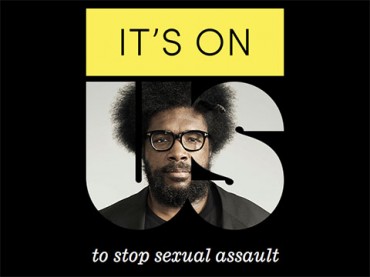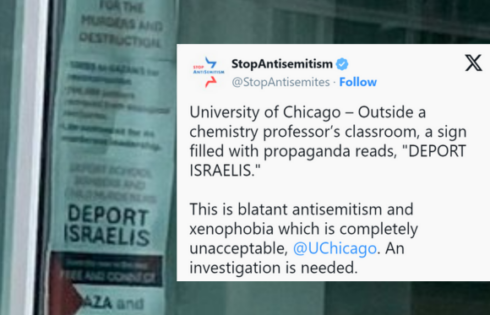
ANALYSIS
A raft of middle-aged celebrities joined forces with the White House Friday to promote the “It’s On Us” campaign against campus sexual assault, appearing in public service announcements that tell viewers they have a role to play in preventing assault and helping victims post-assault.
A 30-second spot features both male and female celebrities – Jon Hamm, Questlove, Julia Louis-Dreyfus and Kerry Washington among others – giving gender-neutral appeals to “get in the way before it happens” and “not blame the victim”:
A 60-second spot, “1 Is 2 Many,” features only males, some known for hypermasculine acting roles – Benicio Del Toro, Daniel Craig – and comedians such as Steve Carrell and Seth Meyers, and makes an explicit pitch to men and their treatment of women.
The actors tell viewers that sexual assault is “happening to our sisters and our daughters, our wives and our friends,” and that if “she can’t consent, it’s rape” and “it’s a crime.” They must “speak up” and “never blame her.” President Barack Obama and Vice President Joe Biden appear in both spots.
The campaign partners include:
- Viacom, whose MTV and other music-video properties will air the spots
- NCAA, which is running a “half-day session on sexual assault and violence prevention” at its January convention
- Electronic Arts, which will bring “It’s On Us” to gamers through its its social network channels and ask them to “Take the Pledge“
- College Humor, Microsoft and Bing, and the U.S. Olympic Committee
A liberal think tank, the Center for American Progress, is also working with the White House, and the ad agency Mekanism – which says it “specializes in reaching millennials” – developed the “concept, creative, and design” for the campaign.
Consent Ill-Defined, Alcohol and Sexual Minorities Downplayed
A few things stand out about the campaign, whose materials can be found on the graphics-heavy It’s On Us site and NotAlone.gov, which lists an enforcement map of schools and tells victims how to file a complaint against their universities.
It doesn’t appear to properly define “consent” or lack thereof. From the PSAs to the resource materials, the campaign tells the audience that “non-consensual sex is sexual assault” and bystanders should intervene where consent “cannot be given.” This shows up under “Tools” on It’s On Us as well, which appears to have the only example of non-consent across the campaign – “too intoxicated to consent.”
This is a recurring issue in lawsuits by punished male students against their schools, such as Occidental College, where plaintiffs claim their sexual partners consented, even if drunk. A University of Oregon survey by sexual-assault tutorial provider EverFi implied that both male and female students don’t have the same view of “consent” as victims’ advocacy groups or the federal government, even after told what the “correct” answers are.
California could become the first state to set a “yes means yes” standard for its universities that requires “affirmative consent” for sexual activity, but Gov. Jerry Brown hasn’t yet signed the legislation.
Drinking is barely mentioned. Only one place in the entire campaign appears to mention the role of alcohol in assault or miscommunication between sexual partners – the “Tools” section of It’s On Us, which features a hard-to-use scrolling format. It tells bystanders to enlist a “bartender” to help in a potential assault situation, “keep an eye on someone who has had too much to drink” or someone who is “deliberately trying to intoxicate” another person, and get a person’s friends to help them “leave safely” if they are “too intoxicated to consent.”
It downplays sexual violence that isn’t men directed toward women. NotAlone.gov’s resources page includes LGBTQ-specific statistics and victims’ services groups, but they appear to go beyond same-gender sexual violence and more broadly address any violence or harassment directed toward sexual minorities. It has similar resources for individuals with disabilities. Both groups suffer high rates of sexual victimization, the resources claim, but they aren’t mentioned in the PSAs or any other highly visible part of the campaign.
NotAlone.gov also posted “Sample Language and Definitions of Prohibited Conduct for a
School’s Sexual Misconduct Policy” directed toward schools.
Its “Unwelcome Conduct” section would appear to interfere with some First Amendment rights of students, though further down the guidance includes boilerplate that it doesn’t threaten students’ speech rights, only prohibiting “sex-based harassment that creates a hostile environment.”
The “Consent” section is also subject to interpretation as to what “impairment or incapacitation” might entail, or how a person can get and maintain consent if his partner shows “silence or absence of resistance” at some point in the sexual encounter.
Greg Piper is an assistant editor at The College Fix. (@GregPiper)
Like The College Fix on Facebook / Follow us on Twitter
IMAGE: It’s On Us press packet






Please join the conversation about our stories on Facebook, Twitter, Instagram, Reddit, MeWe, Rumble, Gab, Minds and Gettr.